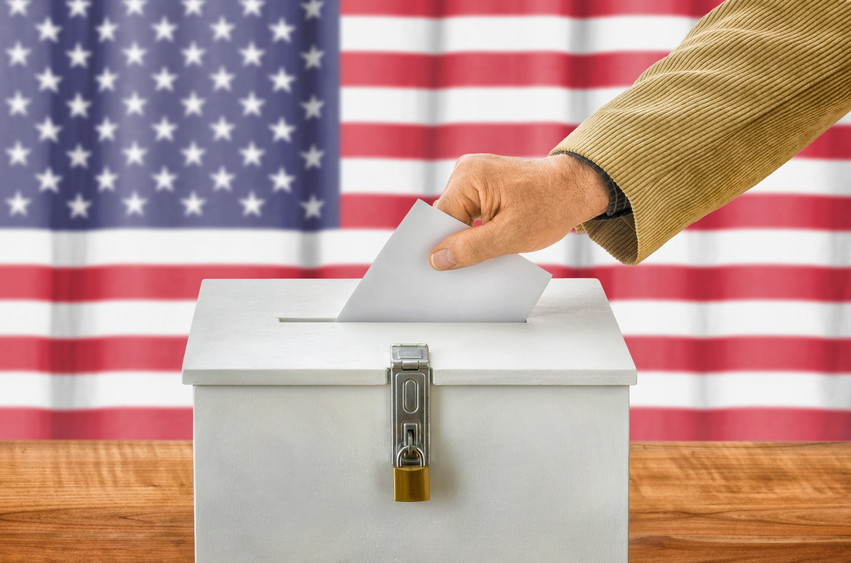Federal court to decide if ballot selfies are tool of free speech or coercion


A free daily email with the biggest news stories of the day – and the best features from TheWeek.com
You are now subscribed
Your newsletter sign-up was successful
Is taking a photo of your ballot an expression of free speech or a potential receipt for a ballot-buyer? A federal court of appeals plans to decide just that Tuesday when a group of judges from the First U.S. Circuit Court of Appeals in Boston will evaluate a New Hampshire ban on ballot selfies, The Wall Street Journal reports.
Ballot secrecy laws date back to an era when it was more common to try to buy votes, and since at least 1979 it has been illegal for a New Hampshire voter to show his or her ballot to anyone else as a means of confirming for whom he or she voted. In 2014, that was clarified to include "taking a digital image or photograph of his or her marked ballot and distributing or sharing the image via social media."
But in court in 2015, the ban was ruled unconstitutional because New Hampshire officials didn't give any evidence indicating ballot selfies have ever actually been used in a vote-buying operation or as a means of coercion. Rather, free speech advocates say that by banning selfies, New Hampshire is infringing on a person's political speech. "The ballot selfie captures the very essence of that process as it happens — the pulled lever, the filled-in bubble, the punched-out chad — and thus dramatizes the power that one person has to influence our government," Snapchat Inc., the social media company behind the eponymous temporary photo-messaging app, argued in a filing on the case last April.
The Week
Escape your echo chamber. Get the facts behind the news, plus analysis from multiple perspectives.

Sign up for The Week's Free Newsletters
From our morning news briefing to a weekly Good News Newsletter, get the best of The Week delivered directly to your inbox.
From our morning news briefing to a weekly Good News Newsletter, get the best of The Week delivered directly to your inbox.
Even lacking any solid evidence, New Hampshire doesn't see it the same way as Snapchat, The Wall Street Journal reports. A lawyer working in support of the ban argued in March: The ban "[ensures] purity and integrity of our elections by protecting the longstanding tradition of the secret ballot."
A free daily email with the biggest news stories of the day – and the best features from TheWeek.com
Jeva Lange was the executive editor at TheWeek.com. She formerly served as The Week's deputy editor and culture critic. She is also a contributor to Screen Slate, and her writing has appeared in The New York Daily News, The Awl, Vice, and Gothamist, among other publications. Jeva lives in New York City. Follow her on Twitter.
-
 5 calamitous cartoons about the Washington Post layoffs
5 calamitous cartoons about the Washington Post layoffsCartoons Artists take on a new chapter in journalism, democracy in darkness, and more
-
 Political cartoons for February 14
Political cartoons for February 14Cartoons Saturday's political cartoons include a Valentine's grift, Hillary on the hook, and more
-
 Tourangelle-style pork with prunes recipe
Tourangelle-style pork with prunes recipeThe Week Recommends This traditional, rustic dish is a French classic
-
 ‘One Battle After Another’ wins Critics Choice honors
‘One Battle After Another’ wins Critics Choice honorsSpeed Read Paul Thomas Anderson’s latest film, which stars Leonardo DiCaprio, won best picture at the 31st Critics Choice Awards
-
 Son arrested over killing of Rob and Michele Reiner
Son arrested over killing of Rob and Michele ReinerSpeed Read Nick, the 32-year-old son of Hollywood director Rob Reiner, has been booked for the murder of his parents
-
 Rob Reiner, wife dead in ‘apparent homicide’
Rob Reiner, wife dead in ‘apparent homicide’speed read The Reiners, found in their Los Angeles home, ‘had injuries consistent with being stabbed’
-
 Hungary’s Krasznahorkai wins Nobel for literature
Hungary’s Krasznahorkai wins Nobel for literatureSpeed Read László Krasznahorkai is the author of acclaimed novels like ‘The Melancholy of Resistance’ and ‘Satantango’
-
 Primatologist Jane Goodall dies at 91
Primatologist Jane Goodall dies at 91Speed Read She rose to fame following her groundbreaking field research with chimpanzees
-
 Florida erases rainbow crosswalk at Pulse nightclub
Florida erases rainbow crosswalk at Pulse nightclubSpeed Read The colorful crosswalk was outside the former LGBTQ nightclub where 49 people were killed in a 2016 shooting
-
 Trump says Smithsonian too focused on slavery's ills
Trump says Smithsonian too focused on slavery's illsSpeed Read The president would prefer the museum to highlight 'success,' 'brightness' and 'the future'
-
 Trump to host Kennedy Honors for Kiss, Stallone
Trump to host Kennedy Honors for Kiss, StalloneSpeed Read Actor Sylvester Stallone and the glam-rock band Kiss were among those named as this year's inductees
